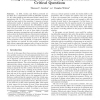Free Online Productivity Tools
i2Speak
i2Symbol
i2OCR
iTex2Img
iWeb2Print
iWeb2Shot
i2Type
iPdf2Split
iPdf2Merge
i2Bopomofo
i2Arabic
i2Style
i2Image
i2PDF
iLatex2Rtf
Sci2ools
129
click to vote
COMMA
2006
2006
The Carneades Argumentation Framework - Using Presumptions and Exceptions to Model Critical Questions
Abstract. In 2005, Gordon and Walton presented initial ideas for a computational model of defeasible argument [12, 26], which builds on and elaborates Walton's theory of argumentation [28, 31]. The current paper reports on progress which has been made in the meantime. It presents a formal, mathematical model of argument evaluation which applies proof standards [8] to determine the defensibility of arguments and the acceptability of statements on an issue-by-issue basis. The main original contribution of the Carneades Argumentation Framework is its use of three kinds of premises (ordinary premises, presumptions and exceptions) and information about the dialectical status of statements (undisputed, at issue, accepted or rejected) to model critical questions in such a way as to allow the burden of proof to be allocated to the proponent or the respondent, as appropriate. Both of these elements are required for this purpose: presumptions hold without supporting argument only so long as...
Carneades Argumentation Framework | COMMA 2006 | COMMA 2008 | Critical Question | Defeasible Argument |
| Added | 30 Oct 2010 |
| Updated | 30 Oct 2010 |
| Type | Conference |
| Year | 2006 |
| Where | COMMA |
| Authors | Thomas F. Gordon, Douglas Walton |
Comments (0)

